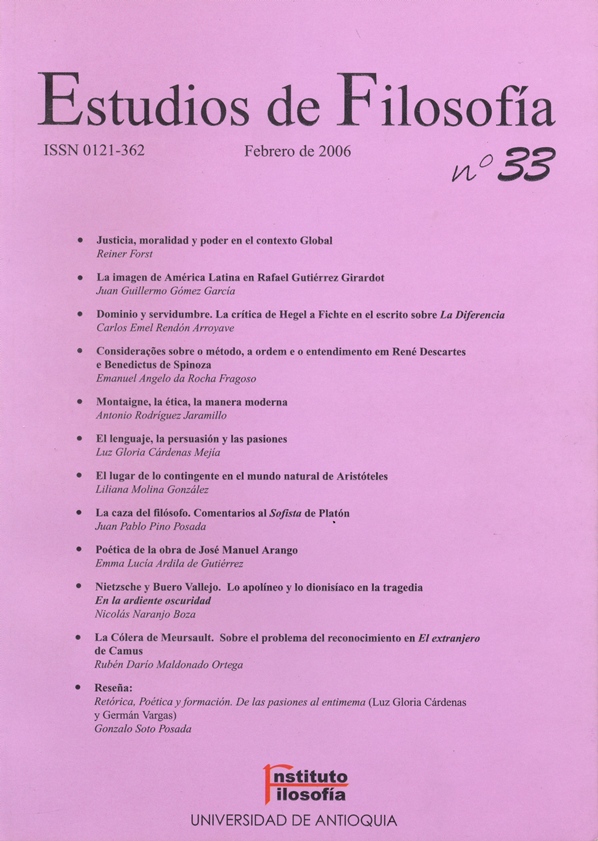Dominio y servidumbre. La crítica de Hegel a Fichte en el escrito sobre la Diferencia
DOI:
https://doi.org/10.17533/udea.ef.12821Palabras clave:
Fichte, naturaleza, razón, derecho natural, dominio, sometimiento.Resumen
Este artículo es una revisión a la crítica que hace Hegel a la concepción de la naturaleza que subyace a la filosofía teórica y práctica de Fichte. En el escrito “Diferencia entre los Sistemas de Filosofía de Fichte y Schelling” (1801), Hegel dirige la reflexión hacia la relación de dominio y sometimiento que establece la filosofía de Fichte entre razón y naturaleza respectivamente. Tanto así, que ésta se convierte en la base de la deducción del derecho natural, que tiene como propósito mostrar la posibilidad de la autoconciencia y, con ésta, la de la comunidad humana en general. Hegel muestra que esta deducción de Fichte es contradictoria, y desde su crítica planteará un nuevo concepto de naturaleza.
Descargas
Citas
Cortés, F. “La ética de la autoconservación y la teoría de los deberes políticos en el Leviatán de Hobbes”, en: Arelé, vol. XIV, No. 1,2002, pp. 5-40. DOI: https://doi.org/10.18800/arete.200201.001
Fichte, J. G. (1796). Grundlage des Naturrechts nach Prinzipien der Wissenschaftslehre. Alemania, Felix Meiner, 1979.
_____________. System der Sittenlehre nach den Prinzipien der W issenschaftslehre. Hamburg, Meiner, 1995.
Hegel, G. W. F. "Differenz des Fichteschen und Schellingschen Systems der Philosophie“, en: Hegel, Jenaer Schriften 1801-1807. Werke 2. Frankfurt, Suhrkamp, 1986.
____________ . "Der Geist zum Christentums und sein Schicksal“, en: Hegel. Frühe Schriften. Werke 1. Frankfurt, Suhrkamp, 1986.
____________ . "Über die wissenschaftlichen Behandlungsarten des Naturrechts, seine Stelle in der praktischen Philosophie und sein Verhältnis zu den positiven Rechtswissenschaften“, en: Hegel. Jenaer Schriften 1801-1807, Werke 2. Frankfurt, Suhrkamp.
____________ . Glauben und Wissen. Hamburg, Meiner, 1986.
____________ . Diferencia entre los sistemas de filosofía de Fichte y Schelling. Madrid, Tecnos, 1990.
Ilting, K. "Hegels Auseinandersetzung mit der aristotelischen Politik“, en: Philosophische Rundschau. München, Karl Alberg, 1963/64, pp. 38-58.
Jamme, Christoph. “Hegels Naturaufassung in Frankfurt”, en: Vieweg, Klaus (ed.). Hegels Jenaer Naturphilosophie. München, Fink, 1998.
____________ . ."Jedes Lieblose ist Gewalt'. Derjunge Hegel, Hölderlin und die Dialektik der Aufklärung“, en: Jamme, Christoph; Schneider, Helmut (eds.). Der Weg zum System. Material ien zum jungen Hegel. Frankfurt, Suhrkamp, 1990, pp. 130-170.
Kant. Kritik der reinen Vernunft. Frankfurt am Main, Suhrkamp, 1991.
Kimmerle, Heinz., "Natur und Geschichte beim Jungen Hegel“, en: Vieweg, Klaus (ed.): Hegels Jenaer Naturphilosophie. München, Fink, 1998.
Nuzzo, Angelica. "Natur und Freiheit in Hegels Philosophie der Jenaer Zeit (bis 1803)“, en: Vieweg, Klaus (ed.). Hegels Jenaer Naturphilosophie. München, Fink, 1998.
Pöggeler, Otto. "Hegels Philosophische Anfänge“, en: Jamme, Christoph; Schneider, Helmut (eds.). Der Wegzum System. Materialien zumjungen Hegel. Frankfurt, Suhrkamp, 1990.
Riedel, Manfred. "Hegels Kritik des NaturTechts“, en: Hegel-Studien. Vol. 4. Bonn, 1967, pp. 177-204.
Siep, Ludwig. Anerkennung als Prinzip derpraktischen Philosophie. Untersuchungen zu Hegels Jenaer Philosophie des Geistes. Freiburg, München, 1979.
Wildt, Andreas. Autonomie und Anerkennung. Hegels Moralitätskritik im Lichte seiner Fichte-Rezeption. Stuttgart, Klett-Cotta, 1982.
Descargas
Publicado
Cómo citar
Licencia
Derechos de autor 2006 Carlos Emel Rendón Arroyave

Esta obra está bajo una licencia internacional Creative Commons Atribución-NoComercial-CompartirIgual 4.0.
Los autores que publican en Estudios de Filosofía acuerdan los siguientes términos:
1. El Autor retiene el copyright del "Artículo", por el cual se entiende todos los objetos digitales que pueden resultar de la subsiguiente publicación o distribución electrónica.
2. En conformidad con los términos de este acuerdo, el autor garantizará a Estudios de Filosofía como Editor el derecho de la primera publicación del artículo.
3. El Autor le concederá al Editor un derecho perpetuo y no-exclusivo, así como una licencia de la misma clase, de publicar, archivar y hacer accesible el Artículo parcial o totalmente en todos los medios conocidos o por conocerse, derecho y licencia que se conocen como Creative Commons License Deed. Atribución-No Comercial- Compartir igual CC BY-NC-SA o su equivalente que para efectos de eliminar toda duda, le permite a otros copiar, distribuir, y transmitir el Artículo bajo las siguientes condiciones: (a) Atribución: Se deben reconocer los créditos de la obra de la manera especificada por el Autor a Estudios de Filosofía, pero no de una manera que sugiera que tiene su apoyo o que apoyan el uso que hace de su obra. (b) No Comercial: No se puede utilizar el Artículo para fines comerciales.
4. El Autor puede realizar otros acuerdos contractuales no comerciales para la distribución no exclusiva de la versión publicada del Artículo (v. gr. ponerlo en un repositorio institucional o publicarlo en un libro) con la condición de que haga el debido reconocimiento de su publicación original en Estudios de Filosofía.
5. A los Autores se les permite y Estudios de Filosofía promueve publicar en línea (online) la versión pre-impresa del Artículo en repositorios institucionales o en sus páginas web, antes y durante la publicación, por cuanto que puede producir intercambios académicos productivos, así como una mayor citación del Artículo publicado (ver The Effect of Open Access). Dicha publicación durante el proceso de producción y en la publicación del Artículo se espera que se actualice al momento de salir la versión final, incluyendo una referencia a la URL de Estudios de Filosofía.















